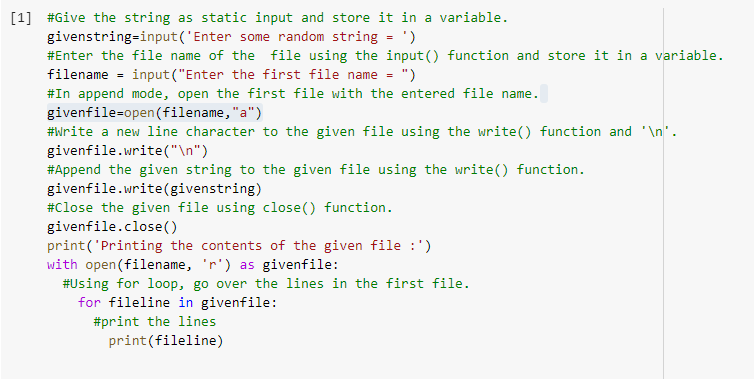

First is the filename along with its complete path, and the other is access mode. We can open files in python using the open function open() Function: In file handling, we have two types of files one is text files, and other is binary files. This is done because scraping data from a website each time you need it is not desirable as it will take a lot of time. This is why we need file handling.įor instance, if you need to analyse, process and store data from a website, then you first need to scrap(this means getting all the data shown on a web page like text and images) the data and store it on your disk and then load this data and do the analysis and then store the processed data on the disk in a file. A program may require to read data from the disk and store results on the disk for future usage. In computer science, we have programs for performing all sorts of tasks. This includes creating, deleting, opening or closing files and writing, reading or modifying data stored in those files. So, File handling in computer science means working with files stored on the disk. If you want to perform any operation on that file like opening it, updating it or any other operation on that, all that comes under File handling. Suppose you are working on a file saved on your personal computer.
PYTHON OPEN FILR FOR WRITING AND APPENDING HOW TO

Here, I have given the size as “25” which is an optional parameter. Firstly, I have opened the file in “w” mode.The truncate() method in Python file, is an inbuilt method in python, it resizes the file to a given number of bytes.Python file fileno() method Python file truncate() method You can refer to the below screenshot for python file fileno() method. Also, we can see that the fileno() returns an integer value which is the file descriptor. Here, when we will print “myfile.fileno()” then the output will appear “ 3 ”. An error can occur if the operating system does not use a file descriptor.Įxample: myfile = open("example.txt", "r")

The Python file fileno() method is an inbuilt method in python, which returns the file descriptor of the stream as a number. Python file readable() method Python file fileno() method When we run the above program, it produces the following output. A file is readable if it’s opened using “r”. To get the output we will print “myfile.readable()” and it will return “True” as an output because the file is readable. The readable() method returns True if the file is readable otherwise it will return False.Įxample: myfile = open("examplefile.txt", "r") The readable() method in Python is an inbuilt method in python, it checks whether a file is readable or not. Python file writable() method Python file readable() method


 0 kommentar(er)
0 kommentar(er)
